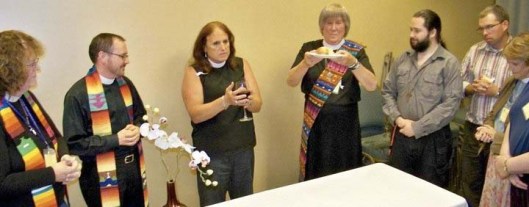
Liberal activist and Episcopal clergywoman Susan Russell recently tweeted an interesting article from Politics and Religion about Cameron Partridge, a transgender clergyman appointed by Massachusetts Bishop Thomas Shaw to be Episcopal Chaplain for Boston University. While Russell celebrates Partridge’s distinction of being one of the first transgender chaplains at a major university, another item was also worth noting:
Partridge “grew up in a fairly conservative church in California with little exposure to women or gay clergy until just before he left for college.”
The concept of transgender clergy originating from conservative/traditionalist circles isn’t remarkable – we have many examples of transgender clergy persons from more orthodox backgrounds, it may even be closer to the rule than the exception. Granted, the Episcopal Church (TEC) currently only has seven transgender persons ordained as clergy – not exactly a large field to collect data from.
My question is not “do conservative religious households produce more children that eventually identify as transgender?” but rather “are children from these households the ones who end up in liberal religious groups, as opposed to children raised either in those liberal circles to begin with, or outside of the church altogether?” If so, why?
A few other examples:
Deacon Carolyn Woodall (the first openly transgender person to be ordained in the Episcopal Church –others transitioned to opposite gender identities after being ordained) was from the traditionalist Anglo-Catholic Diocese of San Joaquin. The remaining Episcopal portion of the diocese pulled a dramatic 180-degree shift after conservative Anglicans took the diocesan majority to the Anglican Church in North America, and Woodall was eventually ordained by much more liberal Provisional Bishop Chester Talton. Still, Woodall participated in the life of – and unsuccessfully sought ordination in – the much more conservative diocese.
Immediately before the push to place gender identity and expression into the Episcopal Church’s nondiscrimination canons, Episcopal LGBT caucus Integrity USA released a documentary entitled “Voices of Witness: Out of the Box.” Both Partridge and Woodall are prominently featured in the short film, as is Carla Robinson, an Episcopal Priest who was previously a male pastor in the traditionalist Lutheran Church – Missouri Synod.
These now-liberal Episcopal clergy are not the only ones: a few years ago, I attended the homosexual activist organization Human Rights Campaign’s clergy call, intended to bring LGBT-affirming clergy to the nation’s capital in order to lobby Congress. Attendees were welcomed by Allyson Robinson, an HRC Foundation Deputy Director. Robinson previously lived as a man and was ordained as a Baptist minister after graduating from Baylor University’s Evangelical Truett Theological Seminary.
I’m not sure if transgenderism will ever reach the prominence of homosexuality in Episcopal circles – quite simply, there just aren’t that many transgender persons within the church. Even at a special Integrity USA service during Episcopal General Convention that was largely focused upon transgender persons, less than 20 were at the actual event. Some of these individuals left their conservative church communities as soon as they decided to manifest their gender perceptions, and then landed within liberal religious circles. It seems less common to meet transgender people who grew up in liberal religion (or outside the church to begin with) and then came to groups like TEC.
Part of the answer may be that those children who grew up in traditionalist religious circles may have had more of a positive imprint of faith in their lives – even though they must now leave those circles in order to embrace what is taboo. Children from liberal religious groups seem to replicate their parents’ religious practices less. Those who grew up outside the church will likely not be drawn into liberal Christianity.
Follow Jeff Walton on Twitter @JeffreyHWalton




Comment by Jim Eckland on January 5, 2013 at 6:24 pm
our Christian Clergy must be “Moral Leaders” of which transgender pastors can never be. I would leave any church that took these steps and every true Christian should do the same !
Comment by Gabe on January 5, 2013 at 11:07 pm
Jeff, I think that your final paragraph sums it up nicely. My guess is that for many of these folks, the atmosphere was nice, but when the theology clashed with their emotion, emotion won out and they found other churches that had no sexual standards and a very low view of the Bible (“God is still speaking” is just another way to say “We’re making this up as we go.”) By going to the Episcopal Church or UCC etc, the transgendered folks could still have the regular meetings and potlucks and not have to deal with things like sin, redemption, and change of hearts.
Perhaps there are statistics out there, but I would be interested to see what percentage of liberal church children stay in the church as adults. Seems to me that not believing in objective truth, the inherent goodness of man, while denying the reliability of the Bible as any source of truth can be done just as easily while sleeping in on a Sunday morning as it can be while sitting in a mostly empty church.
Comment by Gabe on January 5, 2013 at 11:08 pm
Whoops, that should read ” Seems to me that not believing in objective truth, believing in the inherent goodness of man,…..”
Comment by J P Logan on January 18, 2013 at 6:34 pm
Gabe, this post is several days after the fact, so you probably won’t read it, but here goes anyway: I liked your point about the transgendered folks in liberal churches who “still have the regular meetings and potlucks and not have to deal with things like sin, redemption, and change of hearts.” That’s pretty much the definition of liberal churches – and, alas, quite a few conservative churches too. Nothing wrong with socializing with nice pleasant people, but the ekklesia founded by the apostles was more focused on sin, redemption and changes of hearts than on who brought the delicious green bean casserole.
Comment by Acushla on January 6, 2013 at 2:02 am
These people are helping to bring about the fulfillment of the Prophecy of our LORD Yahshua re “the whole world will be as S & G”.
Comment by J S Lang on January 6, 2013 at 12:35 pm
Gabe, I can’t give you data, but I sure know lots of anecdotes: most kids raised in liberal “christian” homes drop out of church completely, though a few (thankfully) decide they’d like full-strength Christianity and end up in evangelical or Catholic churches. the liberal churches can’t rely on the tried-and-true Catholic/Mormon method (make lots of babies, bring them up in church), nor do they evangelize per se, so they have to recruit from the ex-evangelicals (but most of those end up in NO church) and, as you see, from gays and trans – not really a fertile field (don’t pardon the pun).
I don’t want to sound unkind, but when you’re talking about people who are so unaccepting of God’s creation that they attempt to change their own gender, these aren’t exactly people who are any pastor’s dream convert. Turning your whole life upside down (and freaking out your friends and family) because you’re convinced God “made a mistake” isn’t exactly the road to salvation.
Comment by Gus Ravenwheel on January 7, 2013 at 2:43 pm
I would wonder where, Biblically, you would find support for opposing changing anything about one’s self?
Do you think that those who were born near-sighted are thwarting God’s plan for them by purchasing glasses? Would it be sinful, to you, to have lasik surgery on one’s eyes to correct “God’s Creation…” Is having that surgery evidence that you think God “make a mistake…”?
Or, is it reasonable to make physical changes/adaptations to correct existing physical problems?
I can’t think of a single biblical verse that would condemn either transgenderism or having operations to make physical changes. Is there one I’m not thinking of? Just one single verse to support this modernistic-sounding complaint?
Comment by Gus Ravenwheel on January 7, 2013 at 2:45 pm
JS…
I don’t want to sound unkind, but when you’re talking about people who are so unaccepting of God’s creation…
So, if someone is CREATED a certain way, it’s WRONG to try to change it? So, by THAT reasoning, you’d stand opposed to those who would try to change their God-given orientation? If so, good.
In that regard, I would support you.
Comment by J S Lang on January 7, 2013 at 4:50 pm
Your comments have been both polite and eloquent. I’m giving some thought to my positions on many many things. I need to visit some liberal churches and take a 2nd look, I may have been wrong about them. Reaching out to the marginalized and oppressed is what Christ called us to do. I need to widen my circle.
Comment by Gus Ravenwheel on January 7, 2013 at 7:26 am
JS…
I sure know lots of anecdotes: most kids raised in liberal “christian” homes drop out of church completely
Many of us whom you may identify as “liberal Christians” find/have found ourselves being Christian and loving the Bible, yet not finding conservative/traditional teachings to fit with a rational and solidly Christian Biblical interpretation. So, we’ve left traditional/conservative churches because we want to follow God and take the bible seriously, as we learned in conservative churches.
At my church (which most of you all would likely call “liberal”), we are often called the Church of the Last Chance because people who were raised in conservative churches were worn out by the bad theology and lack of consistency in conservative churches and were ready to leave the Church altogether, and they hear about our church and say, “I’ll give it one last chance to find authentic Christianity…” and thus, the name…
People are earnestly wanting a vital, truly Christ-ian Church experience and, for many of us – folk who appreciate much about our conservative backgrounds, but ultimately don’t find it Christ-ian enough and too tainted by culture – we simply can’t find that in modern “conservative” churches.
This would include folk who are gay and transgender, but there are many others, too.
It does a disservice to the facts to suggest that these are people who aren’t serious about following God and only want to match church with our “emotions,” because in most cases I know, nothing could be further from the Truth.
Comment by J S Lang on January 7, 2013 at 12:07 pm
I’m so happy to hear that. I think it’s wonderful when people who share the same ideology gather together and socialize and share their stories of oppression and persecution. Nothing bonds people together like having a common enemy. Robert Hughes, the art critic at Time who died last year, wrote a book about this, The Culture of Complaint. Great book. Charles Sykes’ book A Nation of Victims covers some of the same turf.
Comment by Gus Ravenwheel on January 7, 2013 at 2:34 pm
Culture of complaint? That wouldn’t be us. You couldn’t find a happier, more unified, more joyful or gracious church. We may find, in common, disagreement with our more conservative brothers and sisters, but you’ll also find a good deal of rejoicing in what we learned right, as well as wrong, in our church backgrounds.
I, for one, frequently express praise for my conservative Southern Baptist teachers, preachers, Sunday School teachers, parents and mentors – they taught me to take the Bible seriously and to put following in Jesus’ steps by God’s grace as my primary value in life. They taught me, in fact, to follow God, EVEN IF it means disagreeing with others, even with other Christians. Follow God, follow God, take the Bible seriously… I had that drilled into me and I have taken it to heart. For that, I am quite thankful for my conservative forebears. May God bless them richly!
Is that the sort of culture you are speaking of? If so, then, yes, that is us/me. But you seem to be speaking of something less grace-full and more negative. We are too busy seeking God’s ways and following in Jesus’ steps to complain about our dear brothers and sisters in Christ too much. Disagree with them? Sure. Complain? Rarely (occasionally, but rarely).
Comment by Gus Ravenwheel on January 7, 2013 at 2:35 pm
On the other hand, are you all complaining about your brothers and sisters in Christ who love you and yet disagree with your opinions? Is THAT the culture of complaint being referred to?
Comment by Paul Hoskins on January 7, 2013 at 1:08 pm
I must admit I was deeply moved by the photo of transgender clergy.
Comment by J P Logan on January 18, 2013 at 6:40 pm
Jeff, a belated comment on the last paragraph of your article: you are correct about the children of parents who attend liberal churches, most of them drop out of church completely, which is not surprising, given liberals’ position about “imposing” their faith on others (even their own kids). Granted, many kids who are raised in conservative churches do rebel later in life, but kids raised in liberal churches have nothing to rebel against, so they just sort of fade away quietly. God moves in mysterious ways, and some of those kids do eventually find their way into evangelical churches, embracing something more substantial than the watery faith they were raised in.
Pingback by Transgender: Coming to a Denomination Near You « Juicy Ecumenism on January 24, 2013 at 6:25 pm
[…] Two weeks ago I blogged about transgender clergy, noting that several come from conservative/traditionalist backgrounds and wondering aloud if this is the norm for transgender clergy, rather than the exception. Consistent with this theory, the Minneapolis priest, Kearns, reports that he grew up in a ‘fundamentalist evangelical church.’ […]